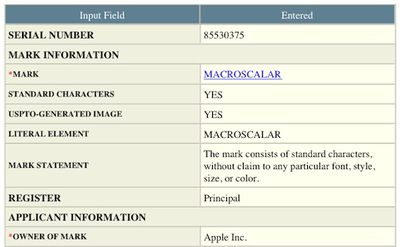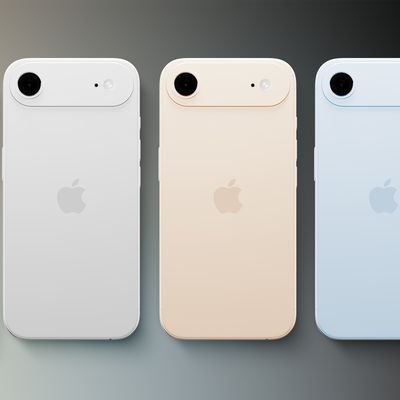Apple's 'Macroscalar' Trademark Application Sparks Speculation on Processor Architecture Advances
Patently Apple reports that Apple last week filed a curious new trademark application for the term "macroscalar". The company has typically quietly registered trademarks in countries such as Trinidad & Tobago, only to later apply for the marks in the United States and other major markets once the new products and features have been announced. While an application for "macroscalar" was indeed filed in Trinidad & Tobago last August, the new U.S. application and a similar one in Hong Kong are sparking speculation that Apple may have jumped the gun in announcing some new processor technology.
Apple's "Macroscalar" isn't just a new marketing line; it's a processor architecture that's been in the works at Apple since 2004. In fact, Apple owns at least four granted patents on the technology that has yet to come to light. We first covered it in 2009 and briefly twice last year.

ZDNet published more on Apple's macroscalar architecture last July following one of those patent disclosures, including an explanation of how the technique could be used to improve processor efficiencies by optimizing data-dependent loops.
The macroscalar processor addresses this problem in a new way: at compile-time it generates contingent secondary instructions so when a data-dependent loop completes the next set of instructions are ready to execute. In effect, it loads another pipeline for, say, completing a loop, so the pipeline remains full whether the loop continues or completes. It can also load a set of sequential instructions that run within or between loops, speeding execution as well.
From a user perspective, the technology could support faster performance and lower power consumption, something Apple would definitely be interested in pursing for its mobile devices.
Since Apple provides its own compilers as well as designing CPUs, it is uniquely positioned to offer a complete macroscalar solution to its large band of iOS developers, further widening the price/performance gap between it and the iPad wannabes.
Is it a breakthrough? It could be if the efficiencies it promises can be realized in practice. We’ll have to see just how good Apple’s compiler engineers are.
While no specifics on Apple's plans have been revealed, the public application for a trademark on the "macroscalar" term is a curious development for the company given that most of its trademarks relate to product and feature names and other promotional descriptions. As a result, speculation suggests that Apple could be preparing to make a significant announcement that will prominently feature the "Macroscalar" term in a similar way to how the company uses "Retina" to describe its high-resolution iPhone and iPod touch displays.
Popular Stories
Apple will launch its new iPhone 17 series in two months, and the iPhone 17 Pro models are expected to get a new design for the rear casing and the camera area. But more significant changes to the lineup are not expected until next year, when the iPhone 18 models arrive.
If you're thinking of trading in your iPhone for this year's latest, consider the following features rumored to be coming...
A new Apple TV is expected to be released later this year, and a handful of new features and changes have been rumored for the device.
Below, we recap what to expect from the next Apple TV, according to rumors.
Rumors
Faster Wi-Fi Support
The next Apple TV will be equipped with Apple's own combined Wi-Fi and Bluetooth chip, according to Bloomberg's Mark Gurman. He said the chip supports ...
Apple's next-generation iPhone 17 Pro and iPhone 17 Pro Max are only two months away, and there are plenty of rumors about the devices.
Below, we recap key changes rumored for the iPhone 17 Pro models.
Latest Rumors
These rumors surfaced in June and July:A redesigned Dynamic Island: It has been rumored that all iPhone 17 models will have a redesigned Dynamic Island interface — it might ...
Apple does not plan to refresh any Macs with updated M5 chips in 2025, according to Bloomberg's Mark Gurman. Updated MacBook Air and MacBook Pro models are now planned for the first half of 2026.
Gurman previously said that Apple would debut the M5 MacBook Pro models in late 2025, but his newest report suggests that Apple is "considering" pushing them back to 2026. Apple is now said to be...
iPhone 17 Pro and iPhone 17 Pro Max models with displays made by BOE will be sold exclusively in China, according to a new report.
Last week, it emerged that Chinese display manufacturer BOE was aggressively ramping up its OLED production capacity for future iPhone models as part of a plan to recapture a major role in Apple's supply chain.
Now, tech news aggregator Jukan Choi reports...
The long wait for an Apple Watch Ultra 3 is nearly over, and a handful of new features and changes have been rumored for the device.
Below, we recap what to expect from the Apple Watch Ultra 3:Satellite connectivity for sending and receiving text messages when Wi-Fi and cellular coverage is unavailable
5G support, up from LTE on the Apple Watch Ultra 2
Likely a wide-angle OLED display that ...
In select U.S. states, residents can add their driver's license or state ID to the Wallet app on the iPhone and Apple Watch, providing a convenient and contactless way to display proof of identity or age at select airports and businesses, and in select apps.
Unfortunately, this feature continues to roll out very slowly since it was announced in 2021, with only nine U.S. states, Puerto Rico,...
The iPhone 17 and iPhone 17 Air will be available in a total of nine color options, according to new information coming out of Asia.
The iPhone 17 Air's expected color options.
According to the leaker going by the account name "yeux1122" on the Korean blog Naver, accessory manufacturers are now producing camera protector rings for the iPhone 17 and iPhone 17 Air in colors to match their...





















